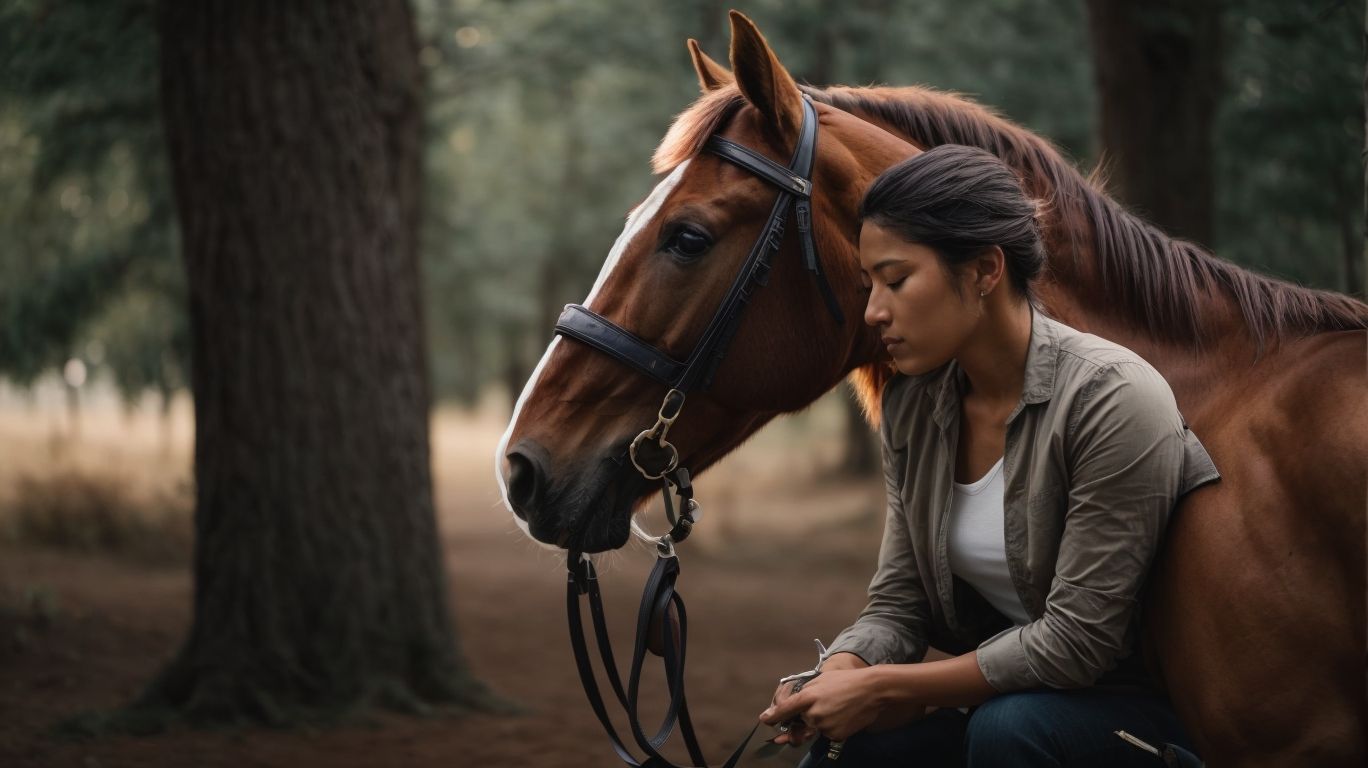html
Understanding horse behavior is crucial for effectively managing and caring for anxious horses. Horses, like any other animal, have their natural behaviors and can exhibit various behavioral issues. By comprehending horse behavior and recognizing the importance of calming anxious horses, you can provide the necessary support and create a safe environment for these majestic animals.
1. Natural Behaviors of Horses:
To effectively manage horse behavior, it’s essential to understand their natural behaviors and instincts. This includes behaviors such as grazing, socializing with herd members, engaging in mutual grooming, and engaging in flight responses when they perceive a threat.
2. Common Behavioral Issues in Horses:
Horses can experience behavioral issues, including anxiety, fear, aggression, and nervousness. These issues can arise due to various reasons, such as past trauma, poor handling, or genetic predisposition. Calming anxious horses is crucial for their overall well-being and maintaining a harmonious relationship between horse and rider.
The Importance of Calming Anxious Horses:
Anxiety can have a significant impact on horses, both physically and mentally. It can affect their performance, hinder their ability to learn, and lead to a compromised quality of life. Calming anxious horses not only benefits their individual well-being but also enhances the safety and success of any interaction or training session.
1. The Impact of Anxiety on Horses:
Anxiety in horses can manifest in various ways, including restlessness, excessive sweating, trembling, and avoidance behaviors. It can lead to compromised immune function, digestive disturbances, and an increased risk of injuries. Understanding the impact of anxiety is crucial for developing strategies to support and alleviate it.
2. The Benefits of Calming Anxious Horses:
By implementing techniques and strategies to calm anxious horses, you can help reduce their stress levels, improve their overall behavior, and enhance their ability to trust and connect with their handlers. Calm and relaxed horses are more receptive to training, exhibit better performance, and have a higher quality of life.
Throughout this article, we will delve into techniques for calming anxious horses, the importance of seeking professional assistance when needed, and strategies for preventing anxiety in horses through proper management, exercise, and nutrition. By understanding horse behavior and actively addressing anxiety, you can provide a nurturing environment for your equine companions and ensure their well-being.
Key takeaways:
- Understanding horse behavior: Recognizing natural behaviors and common issues helps in identifying anxiety-related problems in horses.
- Benefits of calming anxious horses: Addressing anxiety improves overall well-being, performance, and safety for both horses and riders.
- Techniques for calming anxious horses: Creating a calm environment, establishing routine, proper handling, desensitization, and professional assistance contribute to calming anxious horses and preventing anxiety.
Understanding Horse Behavior
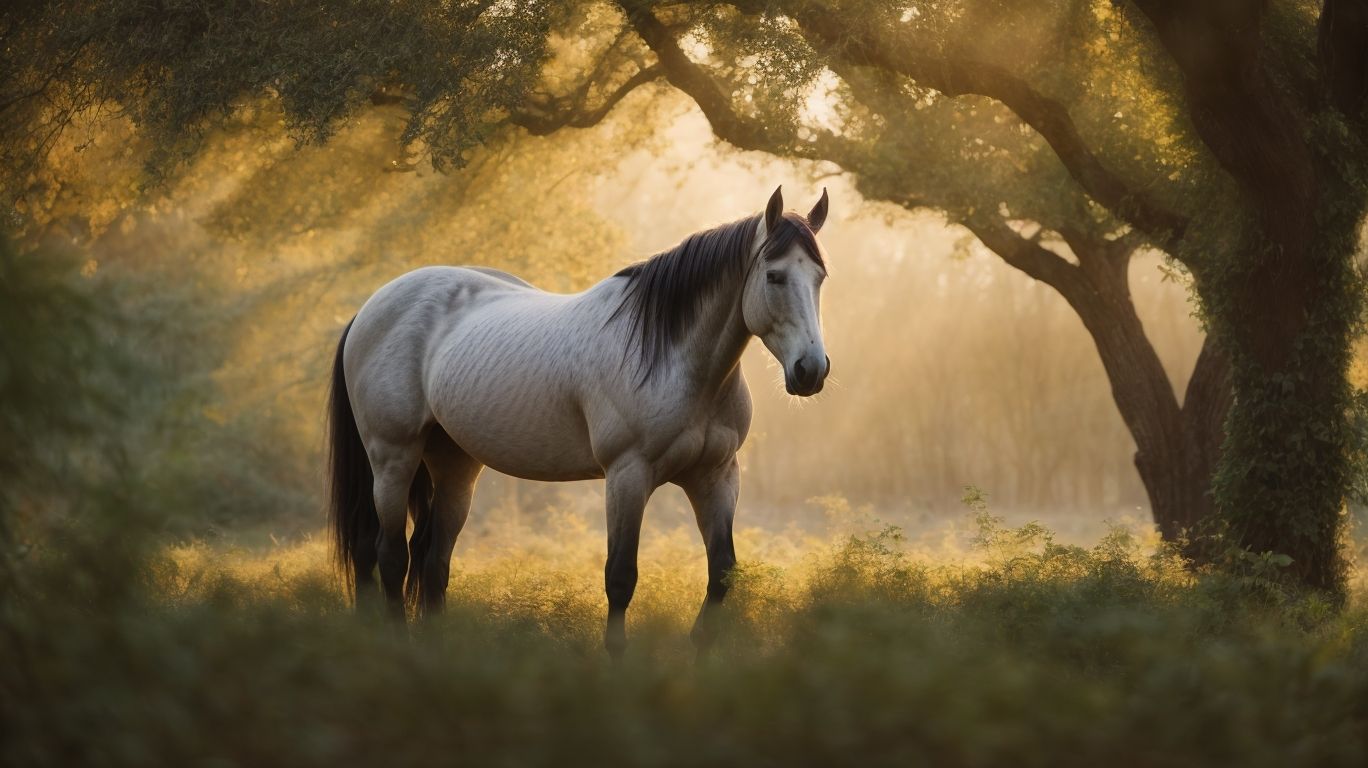
Photo Credits: Www.Horsespeakeducation.Com by Steven Taylor
Ever wondered how horses behave and why? Get ready to unravel the mysteries of horse behavior in this section. We’ll explore the natural instincts and behaviors that drive these majestic creatures, as well as common behavioral issues they may face. From their herd dynamics to their innate flight response, we’ll dive into the fascinating world of horse behavior. So saddle up and join us as we gain a deeper understanding of these incredible animals.
Natural Behaviors of Horses
The Horses exhibit a range of natural behaviors, including grazing, socializing with other horses, and seeking shelter when necessary, that are important to understand when working with them. These natural behaviors are ingrained in their instincts and are essential for their well-being. By recognizing and respecting these natural behaviors, horse owners and handlers can provide an environment that promotes the physical and mental health of horses. For example, allowing horses access to pasture for grazing and providing opportunities for social interaction with other horses can contribute to their overall happiness and contentment. Understanding and accommodating these natural behaviors is fundamental in managing horse behavior effectively.
Common Behavioral Issues in Horses
Common Behavioral Issues in Horses
Dealing with common behavioral issues in horses can be quite challenging. However, it is crucial to have a good understanding of these issues in order to effectively manage them. Some of the common behavioral issues in horses include:
- Aggression – Horses often display aggressive behavior towards humans or other horses, usually out of fear or dominance.
- Separation anxiety – Horses can become anxious or distressed when they are separated from their herdmates. This can lead to behaviors such as pacing or calling out.
- Biting or kicking – These behaviors in horses may occur as a result of irritation or frustration and can be dangerous if not addressed promptly.
- Spookiness – Horses may react strongly to sudden movements or unfamiliar objects due to fear or insecurity.
- Trailer loading issues – Some horses may resist getting into a trailer, which can make transportation a difficult task.
Pro-tip: Successfully addressing these common behavioral issues requires patience, consistent training, and understanding of their underlying causes. Seeking guidance from a professional trainer or equine behaviorist can significantly facilitate the process.
The Importance of Calming Anxious Horses
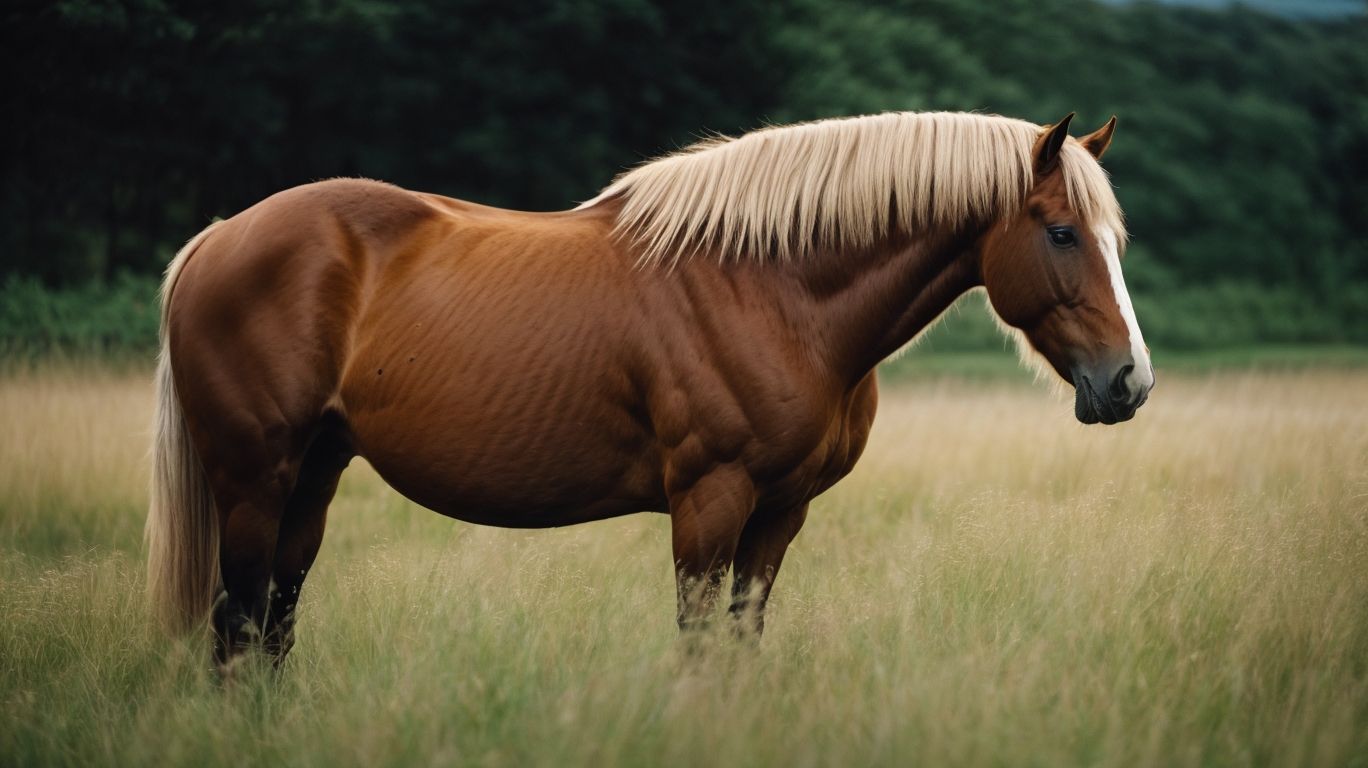
Photo Credits: Www.Horsespeakeducation.Com by Billy Thompson
Anxiety can have a profound impact on horses, affecting their behavior, performance, and overall well-being. In this section, we’ll uncover the significance of calming anxious horses, exploring the consequences of anxiety on equine behavior and the valuable benefits that come with alleviating their stress. Get ready to discover how understanding and addressing horse anxiety can lead to a harmonious and fulfilling partnership with these magnificent creatures. So, saddle up and join us on this enlightening journey to soothing equine anxiety!
The Impact of Anxiety on Horses
The Impact of Anxiety on Horses
Anxiety can have a significant impact on horses, affecting their overall well-being and performance. When horses experience anxiety, it can lead to a range of behavioral and physical issues. Mentally, anxiety can cause horses to become fearful, nervous, and agitated, making them difficult to handle and train. Physically, anxiety can manifest as digestive issues, decreased immune function, and increased muscle tension. It can also hinder their ability to learn and focus. The Impact of Anxiety on Horses is crucial to address anxiety in horses promptly to prevent further complications and promote their overall mental and physical health.
Pro-tip: Implementing calming techniques and creating a relaxing environment can help alleviate anxiety in horses and improve their overall quality of life.
The Benefits of Calming Anxious Horses
Calming anxious horses provides numerous benefits for both the horse and the handler. It creates a safer and more enjoyable environment for everyone involved. Here are the benefits of calming anxious horses:
- Reduces stress
- – Calming anxious horses helps reduce their overall stress levels, leading to improved well-being and better overall health.
- Improved focus
- – Anxious horses may have difficulty focusing on their tasks and training. Calming them helps improve their ability to concentrate and learn.
- Better performance
- – When horses are calm and relaxed, they can perform at their best. Calming anxious horses enhances their performance in various activities, such as riding, competition, or therapy work.
- Enhanced safety
- – Anxious horses can be unpredictable and may exhibit dangerous behaviors. By calming them, the risk of accidents and injuries is significantly reduced.
- Stronger bond
- – Calming anxious horses strengthens the bond between horse and handler. It fosters trust and builds a positive relationship based on mutual understanding and respect.
One example of the benefits of calming anxious horses is illustrated in the story of a racehorse named “Spirit.” Spirit was known to be highly anxious and easily spooked, which affected his performance on the track. His trainer implemented calming techniques such as establishing a calm environment and desensitization exercises. Over time, Spirit’s anxiety significantly decreased, and he became more focused and relaxed during races. As a result, Spirit’s performance dramatically improved, and he went on to win several races. Calming anxious horses can truly transform their lives and fulfill their potential.
Techniques for Calming Anxious Horses
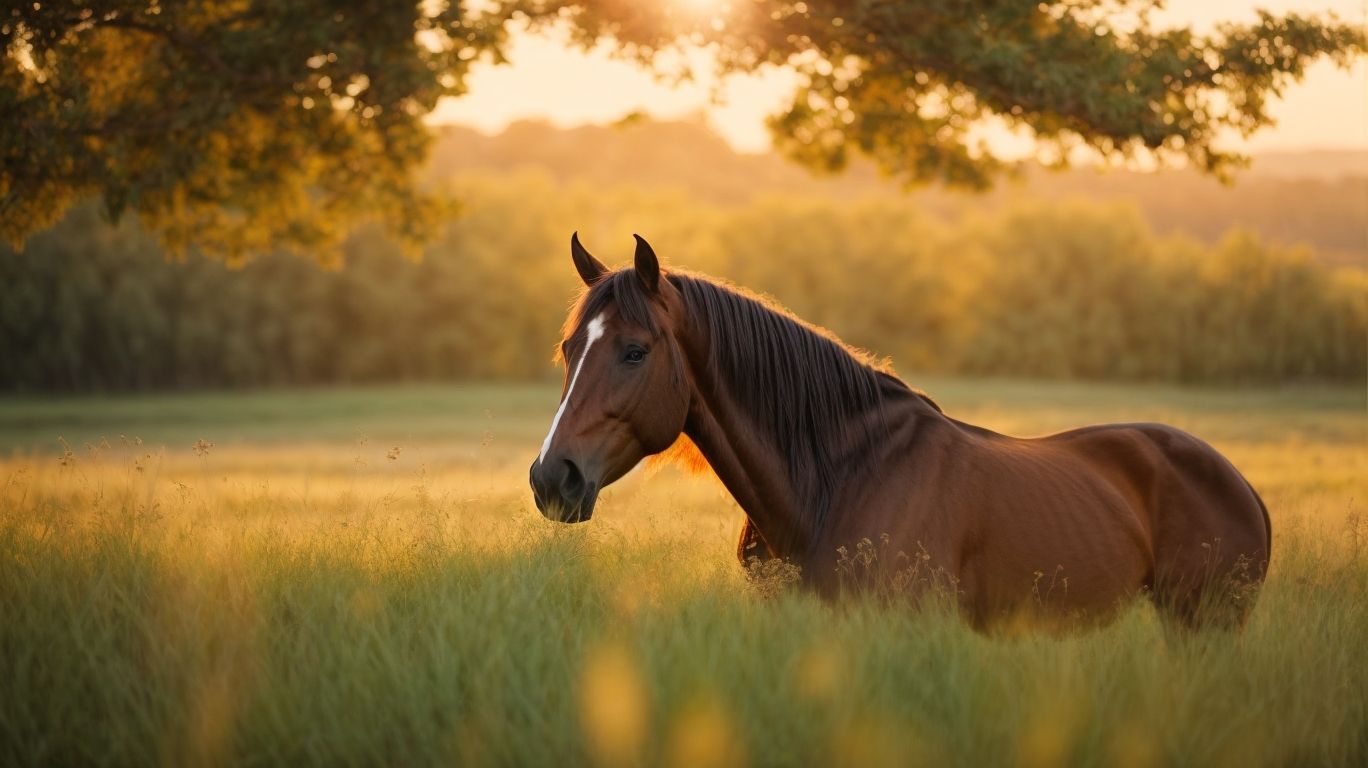
Photo Credits: Www.Horsespeakeducation.Com by Donald Garcia
Discover effective techniques for calming anxious horses as we delve into the world of horse behavior management. From creating a calm environment to establishing routine and consistency, proper handling and groundwork to desensitization and counterconditioning, and even the use of supplements or medications – we will explore a variety of approaches to help soothe and ease the anxiety that some horses may experience. Get ready to empower yourself with the knowledge and tools necessary to promote calmer and happier equine companions.
Creating a Calm Environment
Creating a Calm Environment is crucial when it comes to managing horse behavior and minimizing anxiety. Here are some recommendations for establishing a tranquil atmosphere:
1. Allocate a serene and noise-free space for the horse, away from any loud disturbances.
2. Ensure proper air circulation and sufficient lighting in the horse’s living area.
3. Maintain a clean and clutter-free environment to minimize stress and enhance relaxation.
4. Incorporate calming colors, such as soft blues or greens, into the stable or training area.
5. Introduce soothing elements like calming music or natural sounds to establish a peaceful ambiance.
6. Establish a consistent daily routine to reduce uncertainty and provide a sense of security for the horse.
7. Guarantee that the horse has access to fresh water, high-quality forage, and a comfortable resting area.
By implementing these strategies, horse owners can create an environment that fosters calmness and supports the overall well-being of their horses.
Establishing Routine and Consistency
To establish routine and consistency when working with anxious horses, follow these steps:
- Create a daily schedule: Stick to a consistent routine for feeding, turnout, exercise, and training sessions.
- Establish clear boundaries: Set rules and expectations for behavior and consistently enforce them.
- Use consistent cues: Develop a consistent set of verbal and physical cues for commands and reinforce them consistently.
- Provide a stable environment: Keep the horse’s living space clean, organized, and free from unnecessary disturbances.
- Encourage regular socialization: Allow the horse to interact with other horses and establish regular turnout time with compatible companions.
Consistency is crucial when it comes to working with anxious horses. By establishing routine and consistency, trainers can effectively calm and train these majestic animals. In ancient times, horse trainers understood the importance of routine in building trust and cooperation. They recognized that by maintaining consistent interactions, following regular schedules for feeding and exercise, and creating a stable environment, they could lay the foundation for successful partnerships. Even now, these proven methods are still practiced, highlighting the significance of routine and consistency in soothing anxious horses.
Proper Handling and Groundwork
“`
- Proper handling and groundwork are crucial for calming anxious horses. Here are some steps to follow:
- Approach with a calm and confident demeanor.
- Use consistent body language and clear cues to communicate effectively.
- Establish boundaries and respect personal space to build trust.
- Practice desensitization exercises to help the horse become less reactive to triggers.
- Gradually introduce new environments and stimuli to increase confidence.
Remember, each horse is unique, so adapt your approach based on their individual needs. Building a foundation of trust and clear communication will go a long way in calming anxious horses.
Desensitization and Counterconditioning
Desensitization and counterconditioning are highly effective techniques for calming anxious horses. By implementing these methods, horses can overcome their fears and learn to respond calmly in stressful situations. Let’s explore the step-by-step process involved in desensitization and counterconditioning:
- Firstly, it is crucial to identify the specific triggers that cause anxiety in the horse.
- Next, the horse should be gradually and systematically exposed to the trigger in a controlled manner.
- Initially, start with a low-intensity version of the trigger and incrementally increase the intensity over time.
- To create a positive association, pair the trigger with delightful experiences such as treats or praise.
- Continued exposure to the trigger, coupled with positive reinforcement, will eventually desensitize the horse to it.
- To maintain progress and prevent regression, regular practice is essential.
Let’s consider the story of Bella, a horse who used to be terrified of plastic bags. Through the careful application of desensitization and counterconditioning, Bella’s owner gradually introduced plastic bags to her. Rewards in the form of treats and praise were given to Bella, and with time, she became comfortable around plastic bags. This success story exemplifies the transformative power of desensitization and counterconditioning in calming anxious horses.
Use of Supplements or Medications
When it comes to calming anxious horses, the use of supplements or medications can be a helpful tool. Here are some options to consider:
- Supplements: There are various calming supplements available in the market, such as magnesium or herbal blends, that can help promote relaxation in horses.
- Medications: In severe cases, veterinarians may prescribe medications like sedatives or anti-anxiety medications to help manage and reduce anxiety levels in horses.
While the use of supplements or medications can provide short-term relief, it’s important to address the underlying causes of anxiety and work on long-term solutions, such as training, environmental modifications, and a consistent routine. Consulting with a veterinarian or equine behaviorist can provide further guidance and support.
Working with a Professional
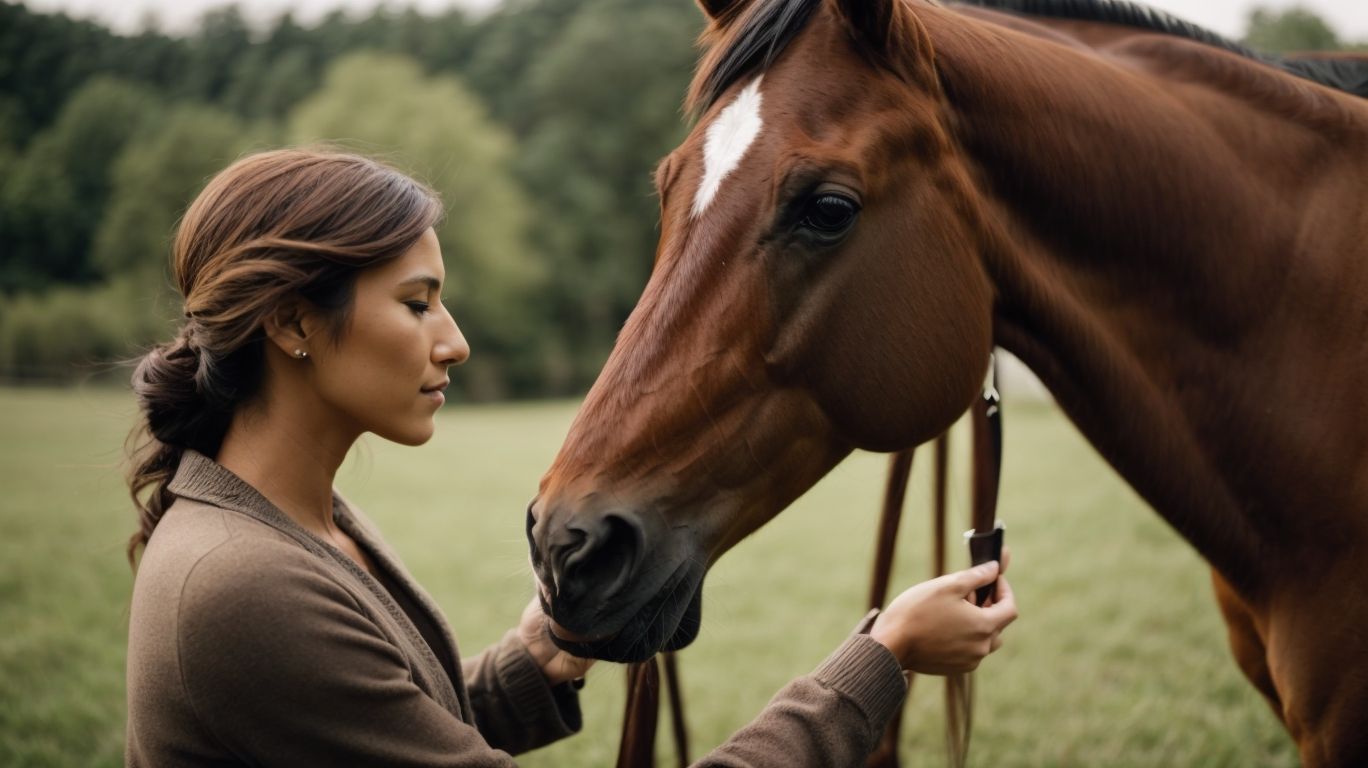
Photo Credits: Www.Horsespeakeducation.Com by Ronald Rivera
When it comes to calming anxious horses, working with a professional can make all the difference. In this section, we’ll explore two key avenues: consulting a veterinarian or equine behaviorist, and seeking professional training assistance. These experts have a wealth of knowledge and experience to offer, helping us understand the underlying causes of anxiety in horses and providing effective solutions. So, let’s dive in and discover the expert strategies that can transform the well-being of our beloved horses.
Consulting a Veterinarian or Equine Behaviorist
Consulting a Veterinarian or Equine Behaviorist is of utmost importance when dealing with anxious horses. These professionals possess the necessary expertise and practical knowledge to diagnose and develop customized treatment plans for your horse’s specific needs. Here is a step-by-step guide on how to consult a Veterinarian or Equine Behaviorist:
- Research: Begin by conducting thorough research to find reputable Veterinarians or Equine Behaviorists who specialize in horse behavior management and anxiety.
- Schedule an appointment: Once you have identified a suitable professional, contact them to schedule a consultation where you can discuss your horse’s behavior and concerns.
- Assessment: During the consultation, the Veterinarian or Behaviorist will perform a comprehensive evaluation of your horse’s behavior, environment, and overall health in order to identify potential triggers or underlying medical conditions.
- Treatment plan: After the assessment, the professional will create a personalized treatment plan that may incorporate behavior modification techniques, medication, and other interventions specifically tailored to address your horse’s individual needs.
- Follow-up: It is crucial to regularly update the professional on your horse’s progress and consult with them regarding any necessary adjustments to the treatment plan.
Consulting a Veterinarian or Equine Behaviorist is not only vital but essential for ensuring the well-being and mental health of your anxious horse.
Seeking Professional Training Assistance
When dealing with anxious horses, it is crucial to seek professional training assistance. Professional trainers have the experience and expertise required to effectively handle and train horses. There are several reasons why seeking professional training assistance is beneficial:
- Expertise: Professional trainers possess a deep understanding of horse behavior and can accurately identify the specific triggers that cause anxiety in horses.
- Skills: Trainers possess the necessary skills and techniques to calm anxious horses and help them overcome their fears.
- Safety: Working with a professional ensures the safety of both the horse and the handler, minimizing the risk of accidents or injuries.
- Tailored approach: Trainers can develop a personalized training plan based on the individual needs and anxieties of the horse.
- Consistency: Professional trainers provide consistent and structured training sessions, which are vital for building trust and alleviating anxiety.
By seeking professional training assistance, you can ensure that your anxious horse receives the essential support and guidance needed to overcome their anxiety and thrive. Remember to choose a trainer who specializes in working with anxious horses and adopts a positive and patient approach.
Preventing Anxiety in Horses
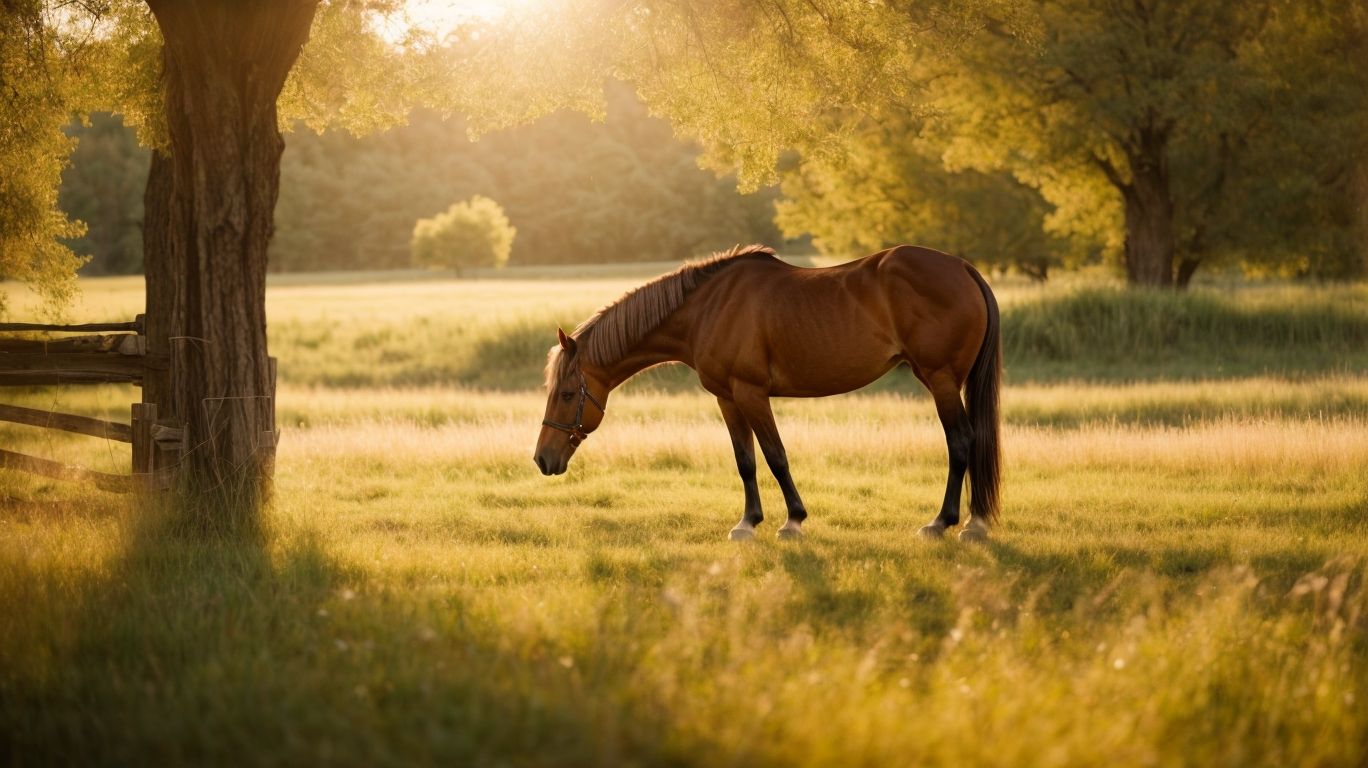
Photo Credits: Www.Horsespeakeducation.Com by Vincent Flores
Preventing anxiety in horses is crucial in ensuring their overall well-being and behavior management. In this section, we will explore key strategies for achieving this, including providing adequate exercise and turnout, balanced nutrition and feeding management, as well as effective socialization and herd integration. By understanding how to address anxiety, we can create a harmonious environment for our equine companions, promoting their physical and mental health. Let’s delve into these insightful approaches for helping our horses thrive.
Providing Adequate Exercise and Turnout
Ensuring that your horse receives adequate exercise and turnout is crucial in managing their behavior and preventing anxiety. To guarantee this is happening, here are a few steps you should follow:
- Allow your horse to enjoy daily turnout in a spacious paddock or pasture for a minimum of a few hours, allowing them to move around freely.
- Provide mental stimulation during turnout by incorporating various activities such as obstacles, toys, or allowing them to engage in natural grazing.
- Engage your horse in regular exercise routines, including riding, lunging, or ground training, to maintain their physical fitness.
- Rotate the areas where your horse is turned out to prevent overgrazing and promote grass regrowth.
- Consider utilizing a horse walker or treadmill as additional exercise options, particularly during unfavorable weather conditions.
Balanced Nutrition and Feeding Management
Balanced nutrition and feeding management are crucial for maintaining the overall health and well-being of horses. Here are some key steps to consider:
- Consult with a veterinarian or equine nutritionist to develop a tailored diet plan based on the horse’s age, activity level, and specific nutritional requirements.
- Ensure access to clean, fresh water at all times and monitor the horse’s water intake regularly.
- Feed high-quality forage, such as hay or pasture, to provide essential fiber for proper digestion and to meet the horse’s energy needs.
- Supplement the diet with concentrated feeds, like grains or pellets, to supply essential vitamins, minerals, and proteins that may be lacking in forage.
- Avoid overfeeding or underfeeding by carefully measuring feed portions and adjusting according to the horse’s condition and workload.
- Divide daily feedings into multiple smaller meals to mimic the horse’s natural grazing behavior and promote better digestion.
- Monitor the horse’s body condition score regularly to assess whether adjustments to the diet are needed.
- Consider adding nutritional supplements, such as omega-3 fatty acids or joint supplements, to support overall health and address specific needs.
- Establish a consistent feeding routine to minimize stress and promote a calm environment during meal times.
Socialization and Herd Integration
Socialization and herd integration are essential aspects of managing horse behavior and decreasing anxiety. Here are some key techniques to effectively incorporate socialization and herd integration:
- Allowing ample turnout time in groups: Horses are herd animals and thrive when they can interact and establish social hierarchies.
- Gradually introducing new horses: It is important to slowly introduce unfamiliar horses to avoid aggressive encounters and encourage bonding.
- Providing sufficient space and resources: Ensuring enough pasture size and feeding stations is crucial to prevent competition and minimize stress.
- Monitoring herd dynamics: Regularly observing the herd helps maintain harmony and address any signs of bullying or exclusion.
- Considering individual needs: Some horses may require more or less socialization depending on their temperament or past experiences.
By implementing these strategies, horse owners can create a harmonious social environment that promotes the well-being and mental health of their horses.
Some Facts About Horse Behavior Management – Calming Anxious Horses:
- ✅ Horses can experience stress and anxiety during travel, competition, or when learning new tasks. (Source: Our Team)
- ✅ Symptoms of anxiety in horses include excessive chewing or grinding teeth, weight loss, spooking easily, pacing, rearing, bolting, sweating, and gastric ulcers or diarrhea. (Source: Our Team)
- ✅ To help horses feel more relaxed and confident, it is important to provide them with a consistent schedule, frequent turnout time, ample access to food and water, and companionship with other horses. (Source: Our Team)
- ✅ Frequent travel, training, or competition can increase stress in horses. (Source: Our Team)
- ✅ Digestive disorders or ulcers are common causes of anxiety in horses, so it is important to rule out these conditions with a veterinarian. (Source: Our Team)
Frequently Asked Questions
How can I relieve anxiety in my horse?
To relieve anxiety in your horse, you can try providing them with a consistent schedule, frequent turnout time, ample food and water access, and companionship with other horses. Additionally, using natural products such as Redmond Daily Gold Stress Relief can help prevent gastric ulcers and reduce anxiety. Working with a veterinarian to rule out any underlying health issues is also important.
What role does the training process play in managing horse anxiety?
The training process plays a crucial role in managing horse anxiety. It is important to ensure that horses understand their jobs well through consistent and clear training methods. This helps reduce confusion and anxiety, as horses feel more confident in their tasks. Using precise aids during training can also help alleviate anxiety and improve the horse’s performance.
Can vision loss or impairment contribute to horse anxiety?
Yes, vision loss or impairment can contribute to horse anxiety. Horses rely heavily on their vision, and when they experience vision changes or have limited sight, they may feel more vulnerable and easily spooked. It is important to provide a calm and familiar environment, establish clear boundaries, and use consistent training methods to help alleviate anxiety in visually impaired horses.
What are the potential causes of weight loss in an anxious horse?
Weight loss in an anxious horse can have several potential causes. Digestive disorders, such as gastric ulcers, are common in horses with anxiety and can lead to weight loss. Additionally, the stress and anxiety itself can cause horses to eat less and lose weight. It is recommended to work with a veterinarian to rule out any underlying health issues and provide appropriate management for weight loss in anxious horses.
How can I reduce anxiety in my horse during frequent travel or competition?
To reduce anxiety in horses during frequent travel or competition, it is important to create a consistent and familiar routine. Establishing ground rules and clear communication of expectations can also help alleviate anxiety. Keeping horses moving in a controlled pattern, such as walking circles or practicing lateral flexion, can help them work off nervous energy and stay focused and calm. Additionally, providing ample rest and recovery time between travel or competition events can help reduce overall stress levels.
What are some signs of anxiety in horses that I should look out for?
Some common signs of anxiety in horses include excessive chewing or grinding teeth, weight loss, spooking easily, pacing, rearing, bolting, sweating, and gastric ulcers or diarrhea. It is important to be aware of these signs and address them promptly to help reduce distress and promote the horse’s well-being.
